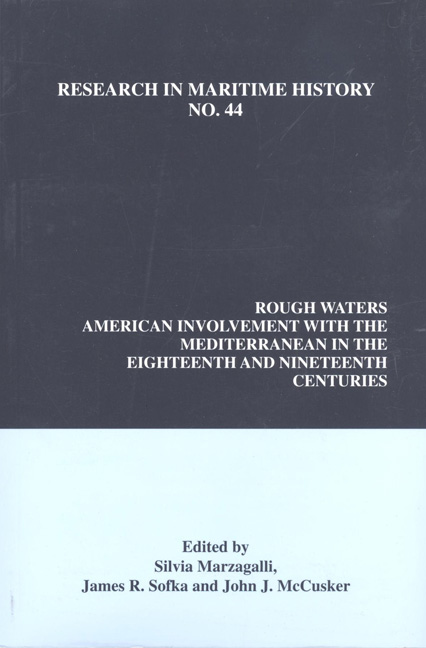Book contents
- Frontmatter
- Contents
- About the Editors
- Contributors' Notes
- “Rough Waters: American Involvement in the Mediterranean in the Eighteenth and Nineteenth Centuries: An Introduction”
- “Worth a War? The Importance of the Trade between British America and the Mediterranean”
- “Relations between North America and the Italian Peninsula, 1763-1799: Tuscany, Genoa and Naples”
- “American Shipping into the Mediterranean during the French Wars: A First Approach”
- “Notes toward a Franco-American Mediterranean 'From Below'”
- “Consuls and Consiglieri: United States Relations with the Italian States, 1790-1815”
- “Old and New Republics: Diplomatic Relations between the Republic of Genoa and the United States of America”
- ‘“From the Halls of Montesuma, to the Shores of Tripoli:’ Antoine Zuchet and the First Barbary War, 1801-1805”
- “Minorca: The First United States Naval Base in the Mediterranean and the American Consulate at Port Mahon”
- “‘The Jeffersonian Idea of National Security’ Revisited”
- “The Reluctant Warrior: Thomas Jefferson and the Tripolitan War, 1801-1805”
- “Slavery as Social Mobility? Western Slaves in Late Eighteenth Century Algiers”
- “Americans in the Mediterranean in the Late Eighteenth and Early Nineteenth Centuries: Concluding Remarks”
“American Shipping into the Mediterranean during the French Wars: A First Approach”
- Frontmatter
- Contents
- About the Editors
- Contributors' Notes
- “Rough Waters: American Involvement in the Mediterranean in the Eighteenth and Nineteenth Centuries: An Introduction”
- “Worth a War? The Importance of the Trade between British America and the Mediterranean”
- “Relations between North America and the Italian Peninsula, 1763-1799: Tuscany, Genoa and Naples”
- “American Shipping into the Mediterranean during the French Wars: A First Approach”
- “Notes toward a Franco-American Mediterranean 'From Below'”
- “Consuls and Consiglieri: United States Relations with the Italian States, 1790-1815”
- “Old and New Republics: Diplomatic Relations between the Republic of Genoa and the United States of America”
- ‘“From the Halls of Montesuma, to the Shores of Tripoli:’ Antoine Zuchet and the First Barbary War, 1801-1805”
- “Minorca: The First United States Naval Base in the Mediterranean and the American Consulate at Port Mahon”
- “‘The Jeffersonian Idea of National Security’ Revisited”
- “The Reluctant Warrior: Thomas Jefferson and the Tripolitan War, 1801-1805”
- “Slavery as Social Mobility? Western Slaves in Late Eighteenth Century Algiers”
- “Americans in the Mediterranean in the Late Eighteenth and Early Nineteenth Centuries: Concluding Remarks”
Summary
Early modern Mediterranean ports attracted an increasing number of Atlantic captains. By the end of the sixteenth century, the AÜantic powers had engrossed an increasing share of Mediterranean shipping services and trade. Their merchants were present in all the major ports and dominated the most lucrative markets, although Mediterranean merchants and captains were not completely marginalized. The consolidation of North European commercial interests was accompanied by intense diplomacy to establish privileged relations with the nations of the Mediterranean rim and to protect ships and merchants from the exactions of Barbary privateering, either by maintaining a military presence or, increasingly, by negotiating peace and paying tribute. By the eighteenth century, the English, French, Dutch, Swedes and Danes had secure maritime routes and reliable ports, services and business partners along the coasts of the Mediterranean and on its islands.
New England ships and sailors had been sailing to the western Mediterranean since the seventeenth century under the protection of the British crown. Southern Europe was an important market for Newfoundland cod, as well as for grain and naval stores from elsewhere in North America. In compliance with the British Navigation Acts, after selling their cargoes American captains either returned directly home or carried Mediterranean goods to England, where they loaded British manufactured goods and sailed westward across the Atlantic.
The independence of the United States and the course of international relations in the following decade disrupted many of these shipping patterns and led to specific challenges which required diplomatic and economic responses from the young Republic. The British Navigation Acts, for instance, now prevented the export of Mediterranean goods to England in American bottoms, a factor which pushed American captains to seek extra profits in intra- Mediterranean tramping in order to sail in ballast to London and to compensate for the trade imbalance through bills of exchange. Within the first decades of independence, the United States also had to find a way to provide a safe passage for its ships near the Barbary coast. Because merchants and captains needed help in dealing with local authorities in major Mediterranean ports, the United States also had to organize a consular service.
- Type
- Chapter
- Information
- Rough WatersAmerican Involvement with the Mediterranean in the Eighteenth and Nineteenth Centuries, pp. 43 - 62Publisher: Liverpool University PressPrint publication year: 2010

